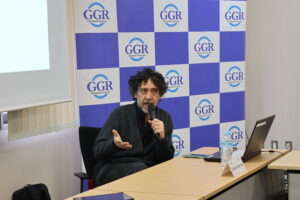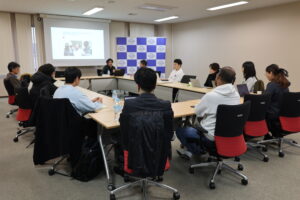On February 21, 2024, the Institute for Global Governance Research (GGR) at Hitotsubashi University hosted the 25th GGR Brown Bag Lunch Seminar titled “Dispute Settlement Outside the State: Evidence from Italy” with Dr. Davide Barrera of the University of Turin, Italy as speaker.
The seminar begun with an exploration of the prevalent default in dispute resolution, acknowledging the state’s monopoly on violence and law enforcement. Dr. Barrera delved into the dynamics of experimental methodology and dispute resolution. Notably, he emphasized the global prevalence of informal or self-administered justice systems, citing examples from diverse regions, including the Caucasus, East Africa, Western Balkans, and Southern Europe, with a specific focus on Sicily. Dr. Barrera’s presentation, citing the movie “Sedotta e Abbandonata,” shed light on why Sicilians might turn to the Mafia for conflict resolution. The central theme explored the choice between state justice and informal systems. His groundbreaking contributions included a new case study in Italy, departing from the traditional focus on developing countries. The methodology featured a representative online sample with geographical diversity, utilizing a vignette experiment to assess respondent behavior in various dispute scenarios. Dr. Barrera’s presentation delved into the nuanced realm of informal justice, spanning matters beyond criminal law, from broken engagements to addressing state law competencies like murder. The coexistence of formal and informal legal orders was observed, with potential explanations rooted in legal pluralism: accessibility issues (lack of resources), mistrust in state institutions (bureaucracy, corruption), and local conventions influencing dispute resolution. The empirical strategy involved randomized manipulations for informal and formal justice variables, revealing similarities in justice choices across disputes and intriguing asymmetries in the impact of manipulated factors, notably the negative influence of resource scarcity on both informal and formal justice choices.
During the Q&A session, questions explored the roots of mistrust in government and local traditions, seeking clarification on education, gender dynamics, and various manifestations of distrust. Suggestions emerged for alternative approaches like reconciliation and mediation, taking into account geographical variations and specific concerns in Southern Italy. In summary, Dr. Barrera’s presentation raised concerns about the role of the state, potential imbalances leading to violence, and a preference for informal justice systems. Emphasis was placed on establishing a causal relationship for public mistrust in the judicial system, considering Italian cultural norms and beliefs, particularly in cases like defamation. The event concluded with a call for further exploration into these intricate dynamics.
【Event report prepared by】
Hnin Htet Htet Aung (Master’s student, School of International and Public Policy, Hitotsubashi University)


